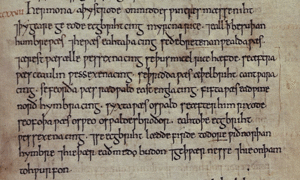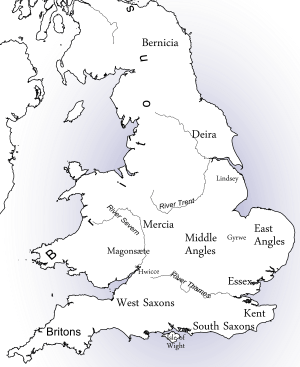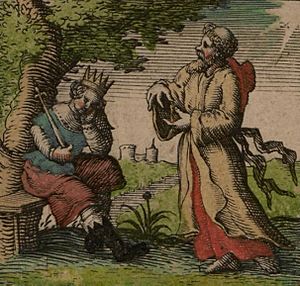Bretwalda facts for kids
The word Bretwalda (pronounced BRETT-wal-duh) is an Old English word. It was used to describe some very powerful kings in early England. These kings ruled over their own kingdoms and also had a lot of power over other nearby Anglo-Saxon kingdoms.
Historians aren't sure if the word "Bretwalda" was used by the kings themselves back in the 5th century. It might have been invented later, in the 9th century, when the Anglo-Saxon Chronicle was written. This old book is where we first see the word. The exact meaning of Bretwalda is debated. It could mean 'wide-ruler' (a king who rules over a large area) or 'Britain-ruler' (a king who rules over all of Britain).
Interestingly, some of the most powerful kings, especially those from Mercia in the middle of England, were not called Bretwaldas in the Anglo-Saxon Chronicle. This might be because the Chronicle was written from the point of view of the West Saxons, who were sometimes rivals of Mercia.
Contents
Who Were the Bretwaldas?
The Anglo-Saxon Chronicle and another historian named Bede listed several kings as Bretwaldas. These kings had a lot of influence and power over other kingdoms.
Kings Listed by Bede and the Chronicle
Here are some of the kings who were called Bretwaldas:
- Ælle of Sussex (ruled around 488–514)
- Ceawlin of Wessex (ruled 560–592)
- Æthelberht of Kent (ruled 590–616)
- Rædwald of East Anglia (ruled around 600–624)
- Edwin of Deira (ruled 616–633)
- Oswald of Northumbria (ruled 633–642)
- Oswiu of Northumbria (ruled 642–670)
Powerful Mercian Kings (Not Called Bretwaldas)
Even though they weren't given the title "Bretwalda" in the Chronicle, some kings of Mercia were very powerful. They had as much, or even more, control over other kingdoms than the listed Bretwaldas.
- Penda of Mercia (ruled 626/633–655)
- Wulfhere of Mercia (ruled 658–675)
- Æthelred of Mercia (ruled 675–704)
- Æthelbald of Mercia (ruled 716–757)
- Offa of Mercia (ruled 757–796)
- Cœnwulf of Mercia (ruled 796–821)
Later Kings Called Bretwaldas
The Anglo-Saxon Chronicle also listed two later kings from Wessex as Bretwaldas:
- Egbert of Wessex (ruled 829–839)
- Alfred of Wessex (ruled 871–899)
Another Powerful King
- Æthelstan of Wessex (ruled 927–939) was also a very powerful king. He was called a "wide-ruler" in a document from his time.
What Did "Bretwalda" Mean?
The first part of the word bretwalda might come from "Briton" or "Britain." The second part means 'ruler' or 'wielder'. So, it could mean 'ruler of Britain'.
However, some historians think the word bretwalda comes from an Old English word meaning 'to break' or 'to spread widely'. If this is true, then bretwalda would mean 'wide-ruler' or 'a king whose power was spread widely'. This idea fits with other Old English words like bryten rice (meaning 'wide kingdom').
Was it an Official Title?
There is no clear proof that "Bretwalda" was an official title that kings used. It probably didn't come with specific rights or powers. It seems more like a way the West Saxon chronicler described powerful kings.
For example, Bede, who wrote in Latin, never used the term "Bretwalda." He listed kings who held imperium (meaning 'power' or 'command'). But even Bede missed some very powerful kings, like Penda of Mercia. Penda clearly had a lot of power, but Bede didn't include him. This might be because Bede was from Northumbria, and Mercia was often an enemy.
The Anglo-Saxon Chronicle, written by West Saxons, also left out powerful Mercian kings like Offa. This suggests that the use of "Bretwalda" might have been a way for the West Saxons to show that their kings had a right to rule over all of Britain.
Overlordship in Anglo-Saxon England
During the Anglo-Saxon period, kingdoms often had complex relationships. Some kings were dominant, and others were subservient (meaning they had to obey). A powerful king might grant land in another kingdom, showing his control.
Mercia was very powerful for much of the late 600s and 700s. Even though Mercian kings are often missing from the "Bretwalda" lists, they definitely held a lot of power over other Anglo-Saxon peoples. The idea of one king having power over all of Britain was recognized, even if the exact term "Bretwalda" wasn't always used or understood in the same way.
See also
 | Lonnie Johnson |
 | Granville Woods |
 | Lewis Howard Latimer |
 | James West |




